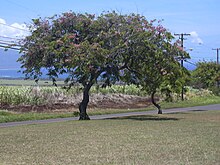Cassia (genus)
| Cassia | |
|---|---|
 |
|
| Cassia javanica | |
| Scientific classification | |
| Kingdom: | Plantae |
| (unranked): | Angiosperms |
| (unranked): | Eudicots |
| (unranked): | Rosids |
| Order: | Fabales |
| Family: | Fabaceae |
| Subfamily: | Caesalpinioideae |
| Tribe: | Cassieae |
| Subtribe: | Cassiinae |
| Genus: |
Cassia L. |
| Species | |
|
Hundreds; see text |
|
| Synonyms | |
|
|
Hundreds; see text
Cassia is a genus of flowering plants in the legume family, Fabaceae, and the subfamily Caesalpinioideae. Species are known commonly as cassias. Cassia is also the English common name of some species in the genus Cinnamomum of the family Lauraceae. Species of the genera Senna and Chamaecrista were previously included in Cassia. Cassia now generally includes the largest species of the legume subtribe Cassiinae, usually mid-sized trees.
Cassia species occur in a range of climates. Some can be utilized widely as ornamental plants. They have been used in reforestation projects, and species from desert climates can be used to prevent desertification.
Cassia species are used as food plants by the caterpillars of many lepidopteran taxa. For example, the skipper Astraptes fulgerator and the pierids Catopsilia pomona and C. pyranthe are all seen on Cassia fistula. The latter utilizes several other cassias, as well.
The plant pathogenic viruses cassia yellow blotch bromovirus and cassia yellow spot potyvirus were first described from Cassia.
...
Wikipedia
